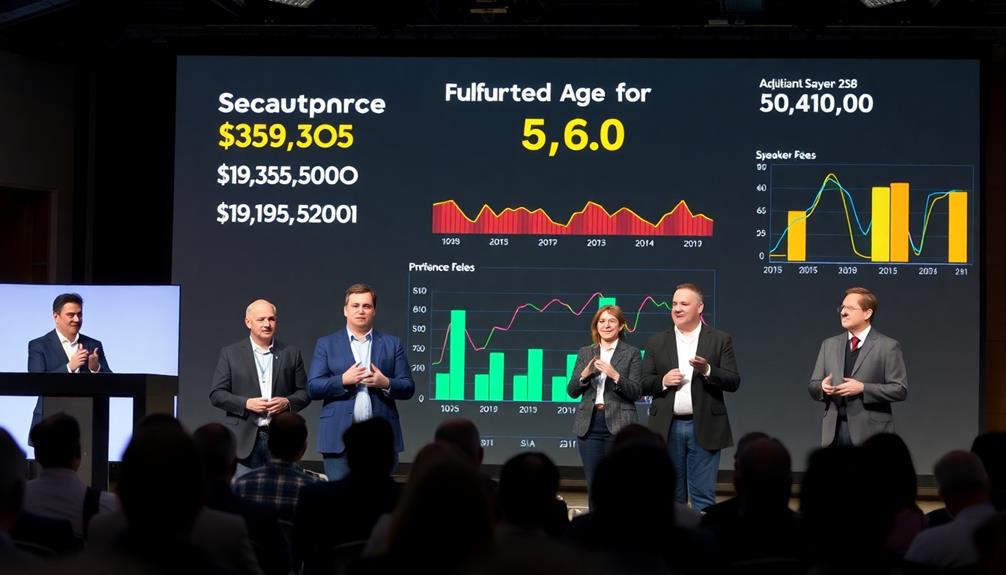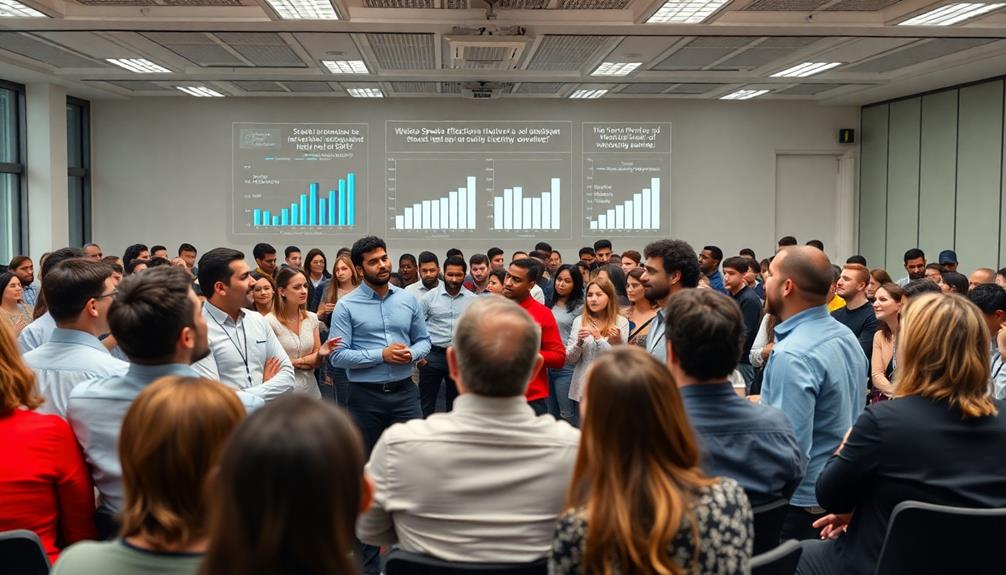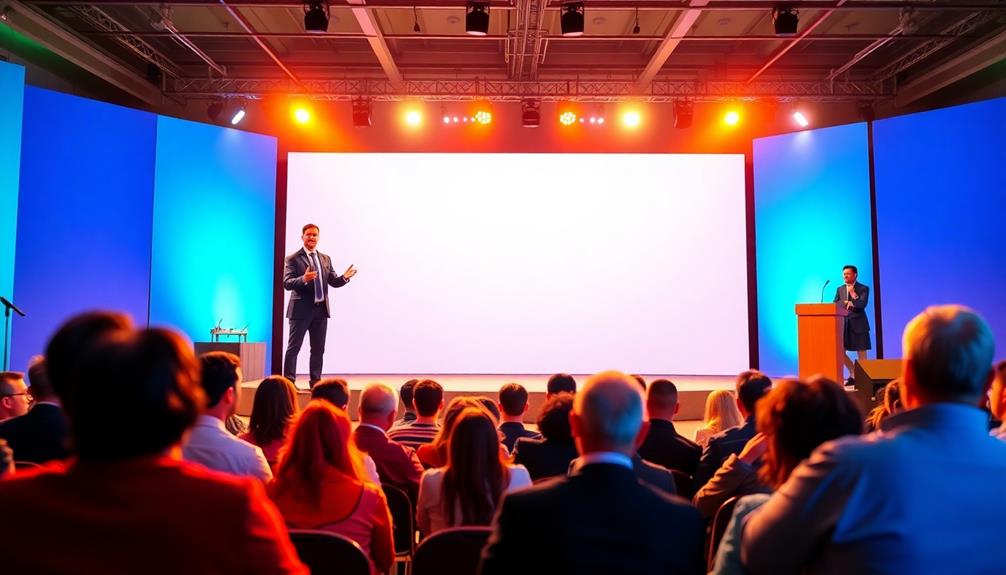Determining how much to charge for speaking engagements in 2024 depends on your experience, audience size, and event format. Well-known speakers can demand fees from $5,000 to over $100,000, while virtual engagements typically yield lower rates, often 50% to 70% less than in-person events. Flat fees are common, but you might consider per person rates for larger audiences. Remember to factor in preparation time, travel, and accommodations. Additionally, early bookings and sponsorships can reduce costs. By understanding these elements, you'll better position yourself for success—stick around to explore even more strategies for setting your ideal fee. Building a strong personal brand and showcasing your expertise through social media, publications, or recorded talks can significantly boost your credibility and demand. Networking with event organizers and utilizing platforms like speaker bureaus are also excellent strategies for learning how to get paid speaking gigs that match your niche and value. Ultimately, being flexible while clearly communicating your worth will help you secure opportunities and grow your speaking career.
Key Takeaways
- Consider your reputation and experience; established speakers can charge significantly more, ranging from $5,000 to over $100,000 based on demand.
- For virtual engagements, expect fees to be 50% to 70% lower than live events, typically between $5,000 and $10,000.
- Utilize a flat fee structure based on your expertise, while accounting for potential annual rate increases in your pricing.
- Factor in additional costs like travel and accommodation, as well as allocate 10-20% of the total event budget for speaker fees.
- Early bookings and negotiating for multiple engagements can lead to cost savings and more favorable terms for both parties.
Understanding Speaker Fees

When it comes to understanding speaker fees, several key factors come into play. First off, your reputation and experience greatly impact your speaking fees. If you're a well-known author, you might command around $40,000 for a speaking engagement, while famous politicians can charge $100,000 or more.
In contrast, academic speakers often receive minimal or no fees, as their appearances are seen as honors that boost their careers. Additionally, being aware of personal debt forgiveness bills can help you manage your finances effectively, especially if you're considering pursuing public speaking as a career.
Another vital element is the type of event. In-person events generally have higher fees than virtual ones, with high-profile speakers sometimes exceeding $50,000 for live engagements. For virtual speaking engagements, fees typically range from $1,000 to $10,000, reflecting their different demands.
Don't forget about preparation time, either. You'll need about 90 minutes of prep for every minute of your presentation. This effort not only showcases your expertise but also influences your overall speaker fees.
Pricing Models and Structures

In today's competitive speaking landscape, understanding the different pricing models and structures is essential for maximizing your earnings.
Common pricing strategies include flat fees, hourly rates, day rates, and per person fees. Each model caters to different audience sizes and engagement types, allowing you to tailor your approach based on the event's specifics.
It's vital to assess your investment goals when determining your speaking fee, as this can influence how you value your time and expertise.
Flat fees are often established based on your experience and demand, and it's common for speakers to increase their rates annually as their reputation grows.
Alternatively, per person fees allow you to charge based on the number of attendees, ensuring that larger audiences yield higher total compensation.
Additionally, consider the loss leader strategy, where you might speak for free or at a reduced rate to gain visibility and attract future opportunities. This can also provide valuable networking benefits.
For less desirable engagements, unique pricing strategies like the "Eff It, I'll Do It" rate can help you set specific fees, protecting you against scope creep.
Trends in Virtual Engagements

The landscape of speaking engagements is evolving rapidly, driven by the surge in virtual and hybrid events. As a speaker, you have the chance to connect with both in-person and virtual audiences simultaneously, expanding your reach.
Recent technological advancements, such as Apple's AI privacy revolution, are also influencing how speakers engage with their audiences, providing tools to enhance interactivity and personalization.
However, it's crucial to recognize that virtual event fees are generally 50% to 70% lower than in-person ones. For instance, experienced keynote speakers typically charge between $5,000 to $10,000 for virtual engagements.
With the growing demand for digital marketing skills, event organizers are increasingly looking for speakers who can enhance audience engagement through online platforms. This shift means you need to adapt your presentations to create interactive and engaging sessions that retain audience attention.
Looking ahead, trends in virtual engagements may include the integration of virtual reality and augmented reality, offering more immersive experiences.
There's also a strong focus on personalized content and a commitment to diversity and inclusion, which will likely influence your presentations. By staying attuned to these trends, you can position yourself as a sought-after speaker, ready to meet the evolving needs of audiences in a digital world.
Budgeting for Speaker Fees

Allocating a portion of your event budget for speaker fees is crucial for attracting high-quality talent. As an event planner, you should aim to dedicate approximately 10-20% of your total budget specifically for these fees. This guarantees that you can secure experienced speakers who'll elevate your event.
Here are some key considerations when budgeting for speaker fees:
- Early Booking: Secure speakers as early as possible to take advantage of cost savings and better availability.
- Additional Costs: Don't forget to factor in travel and accommodation costs, even for virtual events, as they can greatly impact your overall budget.
- Negotiation: If you're hiring multiple speakers, negotiate fees to potentially gain bulk discounts or favorable terms.
- Sponsorship: Seek out sponsorship opportunities to help offset speaker costs, allowing you to allocate your budget more effectively.
Evaluating Speaker Effectiveness

Evaluating speaker effectiveness is essential for ensuring your event delivers value to attendees. Start by measuring audience engagement through feedback forms and social media interactions. These metrics provide valuable insights into how well a speaker connects with the audience and the impact of their message.
Look for patterns in the feedback—positive comments about delivery or content relevance highlight a speaker's effectiveness.
Don't overlook the power of testimonials and reviews from past engagements. They serve as significant indicators of a speaker's ability to resonate with audiences.
Consider analyzing retention rates during presentations; high retention often signals that the material is engaging and pertinent.
Additionally, track the number of new opportunities or business generated post-engagement. This metric can reveal how effectively a speaker inspires and influences attendees.
High-profile speakers usually command higher fees, and their proven track record of audience engagement and satisfaction ratings backs this up.
Frequently Asked Questions
How Much Should I Charge for a Speaking Engagement?
When determining what to charge for a speaking engagement, consider your experience, audience size, and event type. Research market rates in your niche, and don't underestimate your worth—confidently set your fee based on value offered.
How Do You Calculate Your Speaker Fee?
When you're pricing your speaking engagement, think of it like crafting a fine recipe. Factor in preparation time, audience size, and your unique experience to determine a fee that reflects your value and expertise.
How Much Does Tony Robbins Charge for a Speaking Engagement?
Tony Robbins charges between $100,000 to $1 million for speaking engagements, depending on various factors. His fees reflect his expertise and the added value of workshops or coaching sessions he often includes with his presentations.
How Much Do Authors Get Paid for Speaking Engagements?
You won't believe it! Authors can rake in $40,000 for speaking gigs, but those rockstar authors might command $100,000 or more, while academic types often just get a pat on the back. What a contrast!
Conclusion
In 2024, figuring out your speaking fees can feel like charting a wild jungle of numbers and expectations! You've got the power to command attention and inspire action, so don't shortchange your worth. As you set your rates, remember, you're not just sharing words; you're igniting a fire in your audience's hearts! Embrace the trends and evaluate your impact, because when you step on that stage, you're not just a speaker—you're a force of nature!









